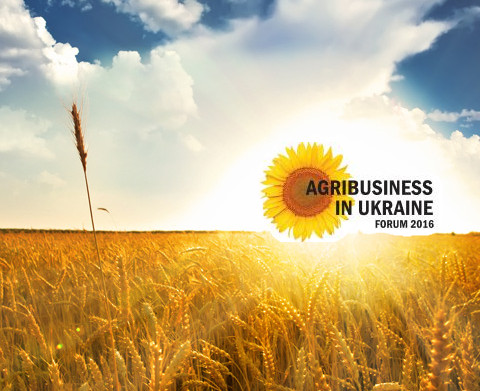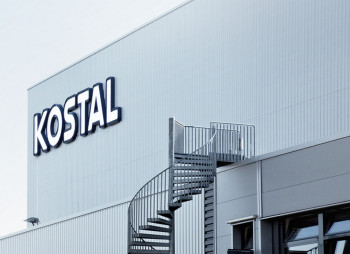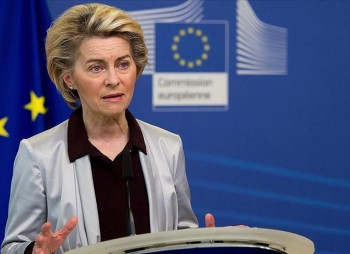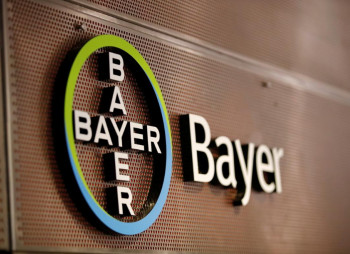In perspective, Ukraine takes heed of Agro and IT industries as most worthwhile and rewarding sectors of the economy. The Adam Smith 7th Annual Ukrainian Agribusiness Forum http://www.ukraineagribusiness.com/ was positive and productive and unfolded the two industries and their capacity of adding value for the country’s economy. Thus, investors of different scale (namely, transnational corporations, financial institutions, as well as local and foreign companies) eye prospects of the kind and speak openly demonstrating ability to conduct business and make a buck.
Morgan Williams, a president of U.S.-Ukraine Business Council acted as a moderator of the investments and raising funds panel, in particular. It is of no surprise that the American gave chance to ask open questions and express opinions. As a result, it inspired popular resentments of corruption; many participants cast slurs on state enterprises, and their market interference and they blamed lofty ranks in rather successful news making and not bringing real change. At this, speakers, namely top management of SME and large agro-holdings proved that pro-active stand wins over negative publicity of the Ukrainian establishment. Top managers seemed to be fed up with the very word of ‘corruption’ and all of them showed how they look and act over.
SME (small and medium enterprises) …
Irina Poplavskaya, Chief Operations Officer of group of companies Agroliga shared their success story. As it happens in Ukraine, it is not that easy to get some USD 3-5mln. Polish partners of Agroliga suggested for this small agricultural enterprise to run IPO at Warsaw Stock Exchange. The very preparations for the listing-- transparency and set up of business processes laid basis for the former and present success of the company. Clear operational management schemes facilitated Agroliga to attract modest EUR 1mln at that time at WSE. As of present, the company builds upon the work completed in the frames of preparations for the IPO. InVenture Investment Group believes that SMEs in agro-sector lack this sort of accounting and operational preparations, that is a cornerstone of raising funds and stimulating of M&A activity in the sector.
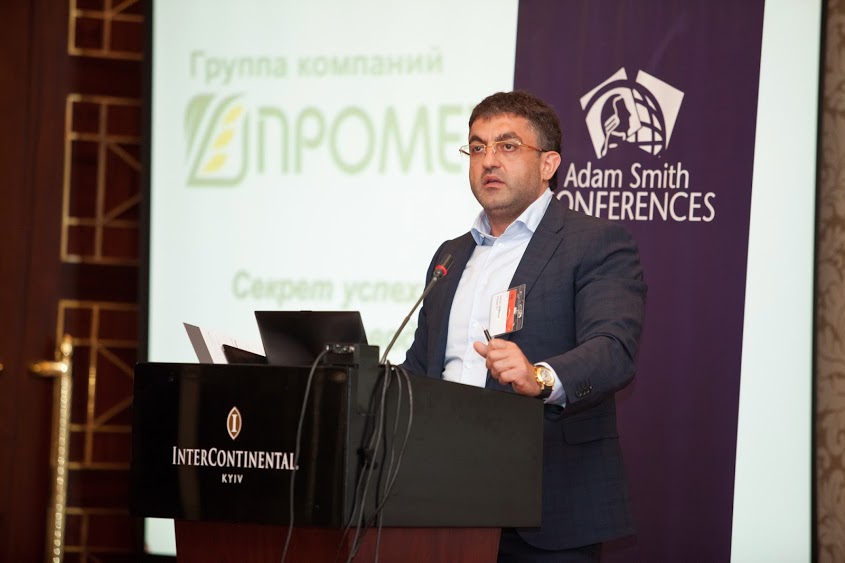
(Mr. Rafael Vaagni, photo taken from http://latifundist.com/)
Rafael Vaagni, the chairman of supervisory board of group of companies Prometey declared that corruption is not an unsurmountable obstacle and illustrated the company’s approaches and operating policies. Those are horizontal integration, PR, investments into infrastructure of elevators, development of logistics, and contracting upon Incoterms CPT. Prometey has mapped out a plan to erect additional 9 elevators and spread operations outside the territories of central Kirovograd and southern Mykolaiv regions moving West into Khmelnytsk and southern Kherson regions. The yearly money turnover of the company stands at UAH 6 bn. At this, an outstanding debt equals to zero. The chairman revealed in private talk that his company takes loans, but sound financial management and exports secure ‘no debt approach’. We believe that Promotey group of companies did it their way not like large agro holdings through vertical integration but determined upon horizontal approach. These approaches bestowed operational autonomy and afforded opportunity to focus on sales. The chairman of supervisory board of group of companies Prometey emphasized that time to invest has come, beware of lagging behind it.
We draw a tenable conclusion that a business model of the accurately defined business processes, thoughtful controlling, and some clear vision to selection of field seeds really offer compelling opportunities to attract debt financing or equity capital.
Many speakers underscored that large agro-holdings control not more than 40% of local farm sector, meantime small and medium farmers dominate over bigger share of the country’s soil. Such a standing gives way to a gradual development of SMEs rather than some activation of M&A activity. As Inna Meteleva, deputy chairman of Svarog West Group put it, “The crisis made all of us stronger”.
Inna Meteleva set the tone for the professional dialogue. “They do not wait for our products abroad. It’s a fiction, popular in Ukraine. We should capture wealthy markets, welcome delegations in niche products, and vehemently dispel a myth in foreign lands about cheap goods from Ukraine. We have to position Ukrainian producers, as the ones making high quality products grown out from a quality soil. At this, we buy seeds in demand, plant protection products and chemicals from abroad. It’s not cheap already, as a matter of fact, but foreign buyers like to fancy buying cheap from Ukraine.
If we speak of investment, the payback period varies: animal farming – 7 years, fruits – 6 or 7 years, elevators – 4 or 5 years. Ukraine needs investments into logistics facilities, transportation and handling of cargo in particular. Meantime long term loans from banks are not available at all, while ministry of agrarian policy delay implementation of the law of agrarian receipts. The pre-harvest financing program has been launched in 4 regions of Ukraine, but it has to be available for the farmers all over the country. (editor note: On April 7, National Bank of Ukraine granted international financial organizations to give loans in UA currency) In reality, only such and other initiatives of IFC and the EBRD help companies to continue. The issue of cooperation is essential for agrarians a lot. I am happy that various market players united to resist the termination of privileged VAT tax treatment for agricultural producers. The new burden of VAT taxation for agrarians came into force starting 1 January, 2016. Such reforms are not beneficial and shatter positions of domestic agrarian companies, but we united to back our interests”, Inna Meteleva made a summary .
Vladimir Osadchuk, the CEO of Noble Resources Ukraine emphasized an important issue of hedging on forward contracts. At the same time he noted that futures contracts, in their turn, are not yet feasible due to the complexity of predicting prices for future periods.
"Export activities concentrate mainly on logistics. The very improvements of logistics processes make it possible to earn money. At this, state monopoly on marine and river terminals impedes to making quick decisions”, complained the CEO of Noble Resources Ukraine. At the same time, it was Vladimir Osadchuk who proposed to get rid of newly imposed VAT burden (note: new tax law came into force since January 2015 abolishing special VAT regime for farmers). The government has to reform the VAT refund system for exporters, as technicalities impede the claiming procedures.
Special attention was paid to problematic judiciary system, which deter investors because of uncertainties in case of adverse scenarios. At this, the question is not in system alone, but for the people who take seats in the judicial system of Ukraine. As their god is their chair and they are focused on not to protecting of the interests of society, but rather on protecting that system itself. They vehemently are protecting their current rights and approaches. As law firm EY Ukraine revealed, tailored law trials are not in practice, as it was before the revolution of 2014. But unethical behavior and weak education of judges, these are core problems in domestic judiciary system.
With regards to agriculture, lawyers believe that lease rights on land cannot become practical collateral in debt financing. To note, land is not an object of commercial trade in Ukraine and is mainly obtained under lease agreements by legal entities. Banks would not be willing to take land lease contract as collaterals because it means they will have to pay under obligations of a land lease contract. And it is a rather exceptional case for banking.
The issues of corporate culture were raised too. Speakers emphasized the very importance of human capital in agriculture for every company. Eleonora Evchenko, HR head of Industrial Milk Company revealed in detail the company’s systematic approach in HR policy and recruitment. Notably, small farmers and households out-executed corporations and have already agreed with domestic higher education institutions to take their best students for practice at their households with prospects for future employment.
Svarog West Group advance even further, they prepare and form whole dynasties and families starting from kindergarten age. Nobles Resources Ukraine, in this respect, propose 1.5 year job training program encompassing on field practical period, work at elevators and barns, traineeship in foreign offices, forward contracting in reality, working closely with top managers, as well as accounting department.
Economic realm
When Ukrainian companies went into detail of real sector, foreign representatives of Ukrainian agriculture showed more academic approach. John Shmorhun, the president of Agrogeneration elaborated on market environment.
In 2014, capitalization of public companies shrunk due to political situation
In 2015, macroeconomic situation and political stability prevailed, while commodities market were weaker; lack of financing and liquidity weigh production
In 2016, new taxation code came into force cancelling special VAT regime for agrarians; it resulted in 10% decrease of EBITDA; capital investments are limited due to geopolitical uncertainties; meantime financial donors of Ukraine promote and force reforms to make lending available.
Jean-Jacques Hervé Board Member of Crédit Agricole Bank, Counsellor in Agricultural Matters was astounded by domestic high interest rates. According to Larisa Bondareva, corporate executive of Ukrainian office of Credit Agricole revealed that banks tended to reduced interest rates and a decision is pending. As of present, lending rates stand at annual 20% in UAH (domestic currency hryvnia) and 9-10% interest in US dollars. Jean-Jacques Hervé has also mentioned local mentality being used to high interest rates and urgent need of trust needed to be bestowed from foreign lending institutions, in case the government continue to fail.
International major Olam revealed its interest in Ukraine. Raj Vardhan, Senior Vice President of CIS region of Olam Group, told he was interested in the event mainly to meet representatives of Ukrainian government during the first panel. Olam is not yet a well know company in Ukraine. To note, Olam operates in 70 countries. Its major shareholders are Temasek Sovereign Fund – 51.4% and Mitsubishi - 20%. The company produces more than 44 of agricultural products worldwide.
Notably, following the event National Bank of Ukraine issued a bill giving way to foreign financial institutions to lend money in domestic currency. In particular, the changes in law related to IFC (International Finance Corporation), and NEFCO (Nordic Environment Finance Corporation). Back to agrarian receipts program, this decision will play its positive role for expansion of the program beyond 4 regions. As of present, only 10-12 banks are lending to agri-sector, the majors being Reiffeisen Bank Aval and Credit Agricole.
Written by Bogdan Zakharkiv


